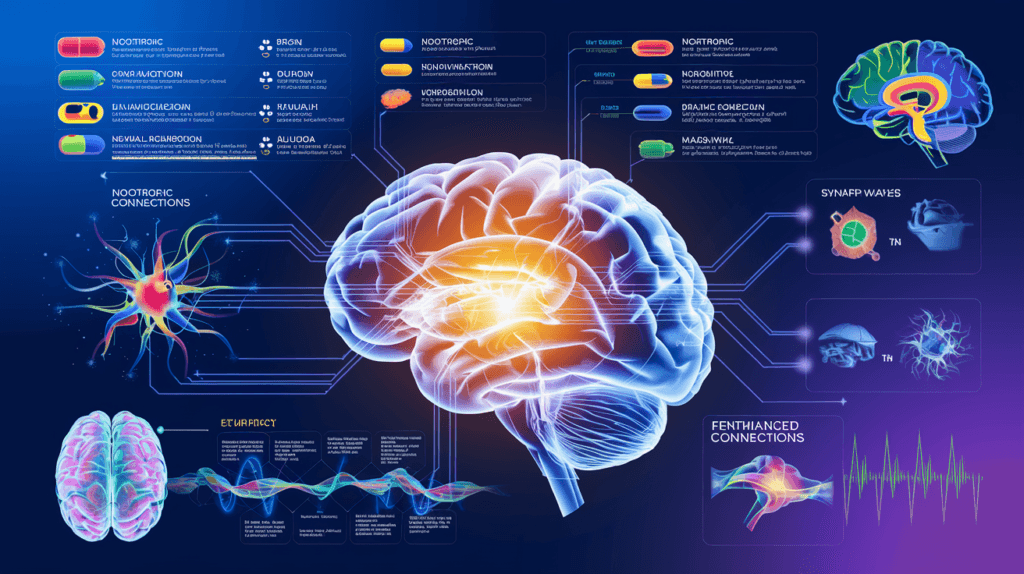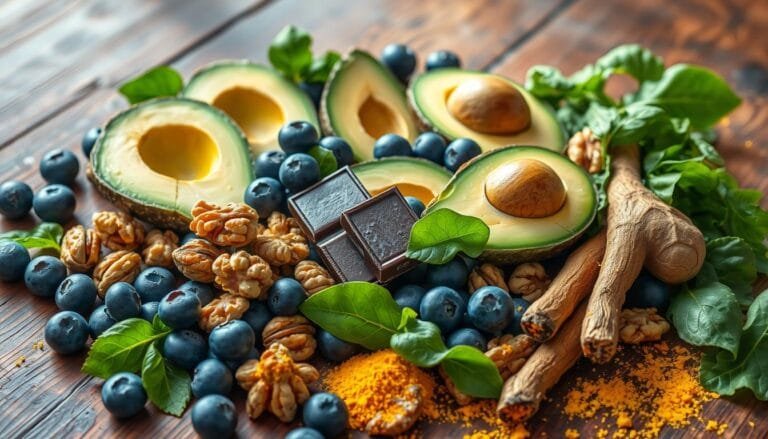Nootropics 101: A Beginner’s Guide
Did you know that one nootropic can boost focus, motivation, memory, and thinking skills all at once1? These substances, known as “smart drugs,” are getting a lot of attention. They help people reach their mental peak. In this guide, we’ll explore nootropics, their history, benefits, and how they affect the brain.
The word “nootropic” was first used in 1972 by Dr. Corneliu Giurgea. He made the first nootropic, Piracetam, in 19631. Dr. Giurgea said a nootropic must improve memory, help the brain under stress, protect it from harm, boost thinking, and be safe for humans1.
Nootropics include many substances, both made and found in nature. Each one offers special benefits for the mind2. They can make memory, creativity, focus, and mental clarity better. Starting your journey with nootropics can open up new possibilities for you.
Key Takeaways
- Nootropics are substances that enhance cognitive functions like memory, focus, and creativity.
- The term “nootropic” was coined in 1972 by Dr. Corneliu Giurgea, who synthesized the first nootropic compound, Piracetam.
- Nootropics can improve memory, attention, problem-solving, and mental clarity by targeting neurotransmitter systems in the brain.
- Nootropic stacks, which combine multiple cognitive-enhancing substances, can provide synergistic benefits and cognitive resilience.
- Natural nootropics, such as herbs, vitamins, and minerals, offer a balanced and safe approach to cognitive enhancement.
What Are Nootropics
Nootropics, also called “smart drugs” or “cognitive enhancers”, are supplements and compounds that boost brain function3. They help with memory, focus, learning, mood, and brain health. There are two types: natural and synthetic.
Natural vs Synthetic Nootropics
Natural nootropics come from herbs, vitamins, and minerals. Examples are caffeine, ginkgo biloba, and omega-3 fatty acids3. Synthetic nootropics, like Piracetam and Modafinil, are made in labs3. Natural ones are safer and gentler.
History and Definition
The term “nootropic” was first used in 1972 by Dr. Cornelius Giurgea4. He said true nootropics should boost memory, learning, and protect the brain without harm4. For centuries, herbs like Bacopa monnieri have been used in traditional medicine4.
Key Benefits Overview
Nootropics improve memory, focus, and mental clarity3. Some, like Modafinil, help with sleep disorders and cognitive issues3. But, the proof for many nootropics is still limited3.
Nootropics affect neurotransmitters, boost brain energy, and protect the brain4. They are mostly safe, but it’s key to know the risks and use them wisely with a doctor’s advice.
How Nootropics Work in the Brain
Nootropics, or cognitive enhancers, affect the brain in many ways to boost thinking skills5. They change how neurotransmitters like acetylcholine, dopamine, and serotonin work. These chemicals help neurons talk to each other6. This can make memory, focus, and mental sharpness better.
Some nootropics also help the brain use energy better by improving mitochondria and blood flow6. Good blood flow means the brain gets the oxygen and nutrients it needs. This keeps the brain healthy and working well.
These supplements also protect the brain from damage and help it adapt to new things6. This is key for learning, remembering, and thinking on your feet. It lets the brain handle new experiences and information better.
Also, some nootropics help manage stress and mood, which helps the brain work better6. By controlling stress and keeping a good mood, they help the brain function at its best.
| Nootropic | Mode of Action | Cognitive Benefits |
|---|---|---|
| Caffeine | Stimulant, affects adenosine receptors | Improved alertness, focus, and reaction time |
| L-Theanine | Amino acid, promotes relaxation and focus | Enhanced cognition, reduced stress and anxiety |
| Creatine | Amino acid, boosts energy metabolism | Improved short-term memory and reasoning |
| Piracetam | Synthetic compound, enhances neurotransmission | Improved memory, learning, and cognitive flexibility |
Nootropics target many brain functions, from neurotransmitters to brain protection and adaptability576. They work in different ways to help the brain. This leads to better memory, focus, mental clarity, and overall brain performance.

Types of Cognitive Enhancement Benefits
Nootropics can boost your mental performance in many ways. They help with short-term and long-term memory, and learning skills8. This is because they work on neurotransmitters and connect brain cells better8.
Memory and Learning
Substances like Panax ginseng and Rhodiola can protect your brain. They also improve memory and learning8. Studies show they support brain functions important for memory9.
Focus and Concentration
Nootropics can also make you more focused and alert. They affect neurotransmitters like dopamine and acetylcholine9. Caffeine, L-theanine, and nicotine help with attention and motor skills10.
Mental Clarity and Processing
They also make your brain work better and faster9. Bacopa monnieri, Rhodiola rosea, and Noopept speed up processing and reduce reaction times10.
Some, like Ginkgo biloba and Panax ginseng, protect your brain. They improve oxygen flow, leading to clearer thinking910.
Even though nootropics seem promising, more research is needed8. They can lead to risky behavior if used without care8.
“Nootropics offer a wide range of cognitive enhancement benefits, from improving memory and learning to enhancing focus, concentration, and mental clarity. But, it’s crucial to use them responsibly and consider the potential risks and side effects.”
Popular Categories of Nootropics
Nootropics come in many forms, each aimed at improving brain function. Piracetam is a racetam that boosts memory and brain performance10. Choline supplements like Alpha GPC and Citicoline increase acetylcholine, helping with memory and speed10.
Adaptogens, including Rhodiola Rosea and Ashwagandha, help manage stress and enhance brain resilience10. Herbs like Bacopa Monnieri and Ginkgo Biloba improve memory and blood flow to the brain10.
A mix of caffeine and L-Theanine is popular for its alertness and focus without jitters10. Ampakines are newer, enhancing attention and alertness by modulating AMPA receptors10.

Though promising, research on nootropics for healthy adults is still growing8. Always talk to a healthcare professional before adding new supplements11.
| Nootropic | Potential Benefits | Recommended Dosage |
|---|---|---|
| Caffeine | Increased alertness and focus | 40-300 mg per day11 |
| L-Theanine | Calming effect without drowsiness | 200-400 mg per day11 |
| Creatine | Improved short-term memory and reasoning skills | 5 grams per day10 |
| Bacopa Monnieri | Faster information processing and improved memory | Various forms with different dose ranges11 |
| Rhodiola Rosea | Reduced brain fatigue and improved performance on difficult tasks | 100-600 mg per day11 |
| Ginkgo Biloba | Enhanced memory and mental processing in older adults | 60-240 mg per day11 |
While these nootropics are promising, always follow the manufacturer’s advice and consult a healthcare professional before using them8.
Safety and Side Effects
Nootropics are mostly safe, but knowing their side effects and interactions is key12. Prescription nootropics like Modafinil can make it hard to fall or stay asleep12. Adderall, used for ADHD, might raise your heart rate12. Methylphenidate, for ADHD and narcolepsy, can cause vision changes or blurred vision12.
Memantine, for Alzheimer’s, might lead to high blood pressure or depression12. Studies show that taking prescription nootropics regularly can lead to risky behaviors.
OTC nootropics also have side effects12. Caffeine, found in many OTC nootropics, can be a stimulant. It’s dangerous during pregnancy and can be fatal if taken too much12. L-theanine, another OTC nootropic, helps you feel alert but relaxed, like caffeine12.
Omega-3 fatty acids help repair brain cells and fight aging but can affect blood clotting meds12. Gingko biloba improves brain function but isn’t safe with other nootropics12. Panax ginseng, used to prevent brain diseases, can interact with many medicines and needs a doctor’s advice before use.
Potential Benefits and Risks of Common Nootropics
| Nootropic | Potential Benefits | Potential Risks |
|---|---|---|
| Rhodiola rosea | 12 Protects neurons, treats neurodegenerative diseases, and regulates neurotransmitters positively affecting mood. | – |
| Creatine | 12 Aids in short-term memory and reasoning. | 12 Research on its safety for adolescent athletes is limited. |
| Ashwagandha | 12 Decreases anxiety and stress, helps form new dendrites, modulates GABA pathways. | 12 May lead to abdominal discomfort and drowsiness and is not recommended for children and pregnant women. |
Always talk to a healthcare professional before using nootropics13. The U.S. FDA doesn’t check the safety of OTC nootropics, so getting a doctor’s advice is crucial13. Start with the lowest dose and adjust as needed, as dosages vary widely.
Building Your First Nootropic Stack
Creating your first nootropic stack is an exciting journey. Start by setting clear goals, like improving memory or focus14. Natural supplements like CDP-Choline, Bacopa Monnieri, and Lion’s Mane Mushroom are great starting points14.
Start with small doses to see how you react14. Try different mixes to find what works best for you. Always check for safety and potential side effects14.
For beginners, pre-made nootropic stacks are a good start. They mix ingredients like N-Acetyl-L-Tyrosine and L-Theanine1415. Keep adjusting your stack as your needs change.
“The key to unlocking your full cognitive potential lies in finding the right nootropic stack for you.”
Optimizing brain health is a journey. Be curious, try new things, and listen to your body1415.
Choosing Quality Supplements
When it comes to improving your brain health, the quality of your supplements matters a lot16. Look for products that have been tested by third parties to ensure they are pure, potent, and safe. Good manufacturers follow GMP standards, which means they make consistent, high-quality products16.
The ingredients in your supplements are key to their effectiveness16. Certain ingredients, like B-complex vitamins and herbs like Bacopa monnieri, work best when sourced properly16. It’s important to know what’s in your supplements and how much of it you’re getting16.
Check the reputation of the brands you’re thinking about17. Look for brands known for quality and customer happiness17. Be wary of products that make big claims or don’t share details about their ingredients and testing17.
Getting independent testing and talking to health experts can guide you in choosing the right supplements17. Focus on supplements that are pure, potent, and transparent to support your brain health safely and effectively16.
| Supplement | Benefits | Potential Side Effects |
|---|---|---|
| Piracetam | Improved memory, focus, and mental clarity | Mild gastrointestinal issues, headaches |
| Vinpocetine | Enhanced blood flow to the brain, improved cognitive function | Dizziness, diarrhea |
| Bacopa Monnieri | Improved memory and learning, reduced anxiety | Mild gastrointestinal issues |
| Citicoline | Improved cognitive performance, neuroprotective effects | Mild headaches, insomnia |
Quality nootropics require careful research, a focus on transparency, and advice from health experts17. Investing in top-notch supplements can greatly benefit your brain health and performance16. Choosing quality supplements, particularly nootropic supplements, is essential in reaping the full benefits for cognitive enhancement. These mental performance enhancers can significantly boost memory, focus, and overall brain function, but not all products on the market are created equal. It’s vital to conduct thorough research on the ingredients and formulation of a supplement before adding it to your regimen. Transparency from the manufacturer regarding their sourcing and testing processes can provide insights into the quality and effectiveness of their product.
When assessing nootropic supplements, consider those backed by scientific studies that highlight their efficacy in enhancing mental performance. Look for brain boosters that contain well-researched ingredients such as Bacopa monnieri, Rhodiola rosea, and Lion’s Mane mushroom. These compounds have shown promising results in improving cognitive function, reducing mental fatigue, and promoting neuroprotection. It’s crucial to scrutinize supplement labels for third-party testing and certifications, as this further ensures that the products meet safety and quality standards.
Additionally, consulting with a healthcare expert can provide personalized guidance on which supplements might be best suited for your individual needs. A professional can help determine if certain nootropic supplements align with your health goals, particularly if you have existing conditions or are taking other medications. Their expertise can help navigate the vast array of options, ensuring that your choice is both safe and effective.
Investing in high-quality mental performance enhancers can lead to significant improvements not only in cognitive abilities but also in overall well-being. By prioritizing quality and transparency in your supplement choices, you can harness the power of brain boosters to support your mental health and enhance your daily performance. Ultimately, a thoughtful approach to supplementation can make a substantial difference in the pursuit of sharpened focus, improved memory, and sustained cognitive vitality.
“Nootropics work by enhancing various brain functions to produce results that people can feel, such as sharper focus, improved memory, enhanced learning, mood enhancement, and other cognitive effects.”16
Conclusion
Nootropics offer many benefits for your brain, like better memory and focus. They can also help you feel more mentally clear and handle stress better. But, it’s important to use them wisely and know what you’re doing18.
It’s key to understand how nootropics work, their good points, and any possible downsides. Making them part of your routine should be done carefully and with the right mindset19. As research on cognitive enhancement, brain health, and nootropic benefits grows, these supplements keep showing promise for improving mental skills and overall health20.
If you want to improve your focus, memory, or brain health, nootropics might be a good choice. They can make a big difference in your life. Just remember to stay safe and informed to get the most out of them1820.
FAQ
What are nootropics?
What are the key benefits of nootropics?
How do nootropics work in the brain?
What are the different types of cognitive enhancement benefits from nootropics?
What are the popular categories of nootropics?
Are nootropics safe, and what are the potential side effects?
How do I build my first nootropic stack?
How can I choose quality nootropic supplements?
Source Links
- The Definitive Guide to Nootropics – Nootropics Expert – https://nootropicsexpert.com/nootropics-guide/
- Nootropics 101: The Beginner’s Guide To Cognitive Enhancement Supplements – https://gethellobatch.com/blogs/insights/nootropics
- What Are Nootropics or “Smart Drugs” or Cognitive Enhancers? – https://www.webmd.com/vitamins-and-supplements/features/nootropics-smart-drugs-overview
- Nootropics as Cognitive Enhancers: Types, Dosage and Side Effects of Smart Drugs – https://pmc.ncbi.nlm.nih.gov/articles/PMC9415189/
- Cognitive enhancers – Alcohol and Drug Foundation – https://adf.org.au/drug-facts/cognitive-enhancers/
- Establishing Natural Nootropics: Recent Molecular Enhancement Influenced by Natural Nootropic – https://pmc.ncbi.nlm.nih.gov/articles/PMC5021479/
- Nootropics: Types, safety, and risks of smart drugs – https://www.medicalnewstoday.com/articles/326379
- Can Nootropics Boost Cognitive Function? Here’s What to Know – https://www.verywellmind.com/what-are-nootropics-6749556
- What Are Nootropics (“Smart Drugs” or “Cognitive Enhancers”)? – Consensus: AI Search Engine for Research – https://consensus.app/home/blog/what-are-nootropics-smart-drugs-or-cognitive-enhancers/
- The 14 Best Nootropics and Smart Drugs Reviewed – https://www.healthline.com/nutrition/nootropics
- What are nootropics, and which ones to choose? | Nucleus – https://mynucleus.com/blog/what-are-nootropics
- What Are Nootropics? Benefits, Chart, Side Effects – https://www.medicinenet.com/what_are_nootropics/article.htm
- 5 Ways Nootropics Can Boost Your Brain Health – https://www.health.com/nootropics-8553114
- Start Your Journey with Nootropic Stacks – Nootropics Expert – https://nootropicsexpert.com/beginners-guide-to-nootropic-stacks/
- How to Create the Best Nootropic Stack – Nootropics Expert – https://nootropicsexpert.com/how-to-create-the-best-nootropic-stack/
- Best Nootropics for Beginners in 2025 – Quick Start Guide – https://www.mindlabpro.com/blogs/nootropics/nootropics-beginners?srsltid=AfmBOoqUr8PUgbKZtfcGagS20p3Qva-3FjGjBg14HVu02f1XKefIhQL2
- Nootropics: Benefits and Safety – https://www.verywellhealth.com/nootropics-benefits-and-safety-7499494
- PDF – https://ijarbs.com/pdfcopy/feb2016/ijarbs37.pdf
- Nootropic – https://en.wikipedia.org/wiki/Nootropic
- What Are Nootropics? Exploring Benefits And Market Trends | Vitaquest International – https://vitaquest.com/what-are-nootropics-exploring-benefits-and-market-trends/







